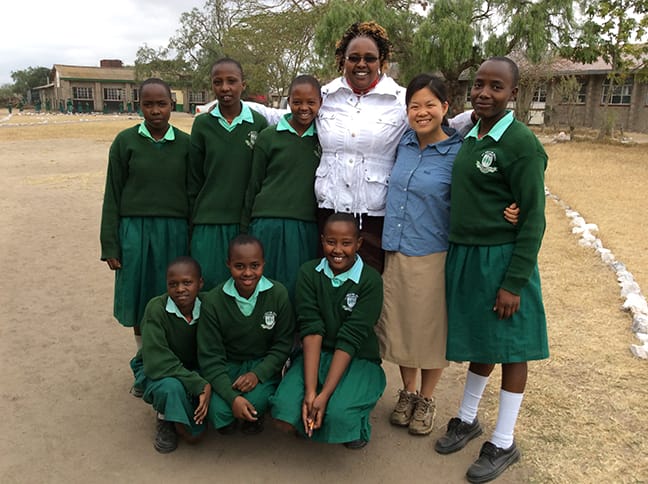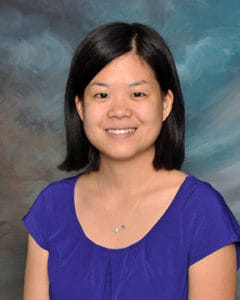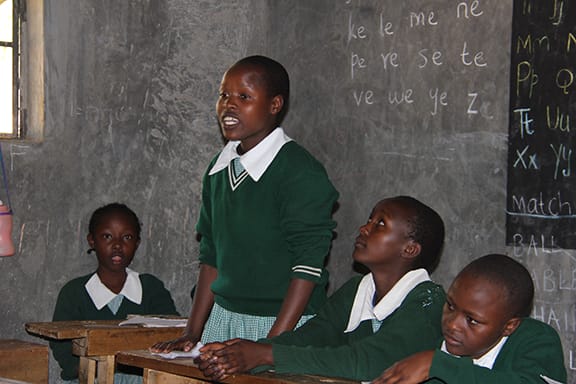Takako Mino: Giving African Youth a Voice

Takako Mino—an alumna of Claremont McKenna College (CMC) and the Teacher Education program at CGU (MA, Teacher Education, 2013)—brings debate to African youth as a tool for sustainable education. A teacher at Rancho Cucamonga High School, Mino has been to Africa four times since 2009 in order to enhance youth empowerment through the art of public speaking.
Over the course of her trips, she has visited several schools, worked with numerous different non-governmental organizations (NGOs), and piloted a program that introduces debate to the East African education system. Although her methods have changed since her first trip to Africa as a junior at CMC, Mino remains consistent in her dedication to education. As an international relations major, she was at first interested in how a country like Uganda could create peace after a devastating civil war. Once she got there, she realized that education was essential to rebuilding community.

“I was struck by the fact that everyone cared about education. If they were saving money for something, it was to take their children to school. That’s where they really put their hopes,” said Mino. “I think that after so many things had been destroyed, they felt that they could only rebuild and be renewed by being able to receive an education, to become empowered and to have a voice.”
Mino modeled her approach to Africa after The Claremont Colleges Debate Union, a 5C program that focuses on competitive debating, professional training, and community outreach. As a part of her work at CMC, she would visit local high schools to provide public speaking and communication training. Mino took these trainings global.
But after that first trip, learning from her work with various NGOs and non-profits and recognizing the divide between the intentions of various organizations and what was actually happening on the ground, she attempted to bridge the gap between theory and practice.
“A lot of them have good intentions, but they aren’t always making the best impact. So I was a little bit cynical about that,” Mino said.
Despite her concerns, Mino returned to Africa for the second time as an intern with the Forum for African Women Educationalists (FAWE), an NGO focused on empowering women and girls with gender-responsive education. She wanted to bring the idea behind the debate program to Africa to help provide the skills that ensure both girls and boys are able to participate equally in education.
Mino proposed an idea to FAWE—a wide-ranging debate outreach and education program that covered a large geographical and cultural area in Uganda. She visited government-funded schools in each region of Uganda and held trainings that covered various aspects of debate: how to create arguments, express an opinion effectively, and do research to support a position. She trained students and teachers alike, and practiced with contemporary issues in African culture, such as bride price (basically a dowry), female circumcision, and government-funded education. During this trip, she was inspired by Uganda’s enthusiasm for education. One story in particular stuck with her.
“I had one student who didn’t even have a candle or a lamp at home, and because there is no electricity in his house, he would go to a nearby gas station to study after dark,” she said.
The next year, Mino received a Napier Initiative grant through Claremont’s Pilgrim Place, a senior community dedicated to service in charitable or religious organizations. As a part of this mission, it partners with the 5Cs to encourage leadership for social change.
With the grant, Mino was able to expand the programs she had already piloted through her second visit. She visited Kenya, Rwanda, Burundi, and Tanzania, and was able to follow up with some of the programs she initially started. It was through this work that Mino realized the importance and difficulties of sustainability.
“Just like in the US, teachers are overworked and underpaid. If the administration was not supporting them in continuing this program, it was incredibly difficult for them to keep it going, especially if you’re not getting paid for it,” said Mino.

In order to address this problem, Mino used the students as resources, invited the teachers to teach with her, and worked directly with the administrations. This time, she partnered with an organization called Asante Africa—asante means “thank you” in Swahili. They worked together to obtain a grant that would help provide funds to continue the program.
After returning from her third trip, Mino realized that she needed to build her skillset to be more effective in a teaching environment, so she came to CGU for the Teacher Education program.
“It helped again to open my eyes to how challenging teaching is as a profession and built my capacity overall as a teacher and as a human being,” she said. “Despite all of that, I still kept Africa in my heart.”
During Mino’s fourth and most recent trip to Africa, she worked with Asante Africa again and revisited the schools from her previous trip. But this time, she did not go at it alone. With the support of CMC and Asante Africa, Mino was able to put into action the educational sustainability that was previously a struggle. She took an intern, Pomona College student Pranay Yeturu, to assist her with the programs, and enlisted the help of two interns from Tanzania, Anderson Hussein and Joel Saitot.
“This time it was really cool. I felt like I wasn’t as alone because I had the support of the organization and the staff, and I had college interns supporting me,” Mino said. “Other people really took the lead. Even though I tried to do more sustainable work [for the last trips], it was still reliant on me. This time, we were able to empower people there to carry it on.”
Mino was particularly moved by the girls in Rwanda, who suffered the most brutality in the recent civil war.
“The girls told me that because women have more power or more of a voice, they don’t think it’s possible for a genocide to happen again,” she said.
The recent conflict was not the only obstacle that Mino faced during her time in Africa. In the government-run schools, corporal punishment is still common. Being respectful of a culture’s customs, however upsetting they may be, was a challenge.
Despite this, Mino believes, as she noted in her TEDxTalk at The Claremont Colleges in 2012, “using our voice is a fundamentally social act. When we speak, we reach out to others…[and] the voice plays a critical role in affirming and securing human rights.”
Her goals remain in Africa. Although teaching locally is fulfilling, she aims to eventually pilot an independent school in Africa that provides an alternate form of education with an emphasis on peace education and human rights. It is her mission to continue the legacy of youth empowerment through education.
“I think what makes education different from other help is that it really stays with the people. You can give someone a lamp, but that lamp can break over time, or someone can steal it,” Mino said. “Education stays with you, no one can take that away from you. That’s what makes it really unique and empowering.”
To see video of Takako Mino’s TEDXTalk, click on the link below: